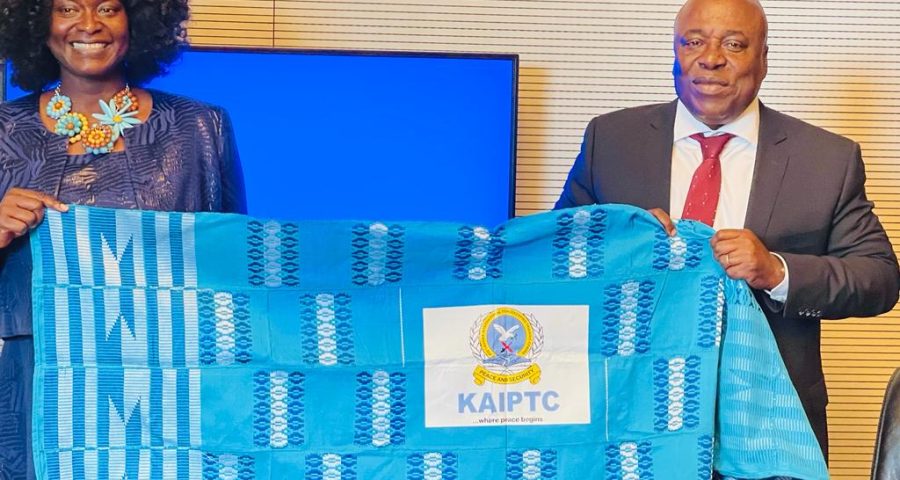Her Excellency Mme Bineta Diop, Special Envoy of the Chairperson of the African Union Commission on Women, Peace and Security, says the Kofi Annan International Peacekeeping Training Centre remains the number one Centre of Excellence in Africa.
“KAIPTC is the number one Centre of Excellence in Africa that is recognised by the African Union Commission and globally in terms of the work the Centre does in peace and security but in particular women peace and security,” she said.
H.E Diop made the remarks when the Executive Management Committee of KAIPTC paid a courtesy call on the Commission in Addis Ababa, Ethiopia, as part of a collaborative visit to key stakeholders of the Centre.
“You are our Centre of reference, and that is why since I took office at the African Union, my first training was with KAIPTC in Accra, Ghana,” she emphasised.
She said women play critical roles in the peace and security architecture and that their involvement in conflict prevention, peace negotiations, and post-conflict reconstruction should not be underestimated.
Therefore, she commended the KAIPTC for its immense contribution to the gender mainstreaming and reinforcing the women, peace, and security agenda in Africa.
She reiterated the Commission’s commitment to work closely with the Centre, saying, “we will continue to work with you to get more skills on the women’s perspectives in peace and security. You have the knowledge, expertise, and commitment.”
Major General Richard Addo Gyane, Commandant, KAIPTC, who led the delegation, said, among others, the visit was to deepen cooperation, collaboration, and enhance engagement with the African Union Commission.
He said in the next phase of the Centre, the issues of women and the youth would be prioritised, and that the Women, Peace and Security Unit of the Centre would be upgraded to a department, with the inclusion of a youth component.
The Commandant said the empowerment of women and the youth in all peace and security processes is crucial for achieving sustainable peace and security in Africa.
Ms. Horname Noagbesenu, Director, Policy Planning Monitoring and Evaluation Department (PPMED), KAIPTC, speaking on the Centre’s strategic plan for 2024 to 2028 stated that, conversations, engagements and consultations with key partners had already began to consider very critical issues and emerging trends to inform the Centre’s strategy in the next five years.
She reiterated that considering the commitments the Centre places on issues of Women, Peace and Security, the first approach is to elevate the Unit into a department to emphasise the critical concerns among women and the youth in peacebuilding processes.
In the last five years, Ms. Horname said, the Centre’s work has been focused on peace and security, adding that one of the areas it had worked on closely was the Continental Results Framework, which an evaluation had proved its importance as one of the major programmes the Centre had run on women, peace and security.
“This is great especially now that proceeds are being seen knowing that different member states are actually developing and pulling together data to be able to support the implementation of the National Action Plans among others,” the Director of Policy Planning Monitoring and Evaluation said.
“That is a big plus for us. However, we can not say that we did this by ourselves, but partnership with the AUC Office of the Special Envoy on Women Peace and Security was key,” she noted.
Moving forward in terms of the strategy, Ms. Horname said that issues around gender-based violence would be critically considered, adding that while a lot of work had been undertaken in the area, there was still a lot of work to be done.
Another area of emphasis, she said, is the implementation of the Protocol to the African Charter on Human and
People’s Rights on the Rights of Women in Africa
(Maputo Protocol), which remains one of the most progressive legal instruments providing a comprehensive set of human rights for African women.
She said it was important to look at the gains chalked over the last 20 years and better utilise the instrument as a means to further actualize the rights of African women for the next five years.
She said, the impact of climate change on women and the effort to bridge the gap between policy and practice to enhance womens role in society will be key areas of focus for the Centre going forward. We believe this will create synergistic approaches to the realities of women and the youth in our communities and help us contribute to addressing them.


